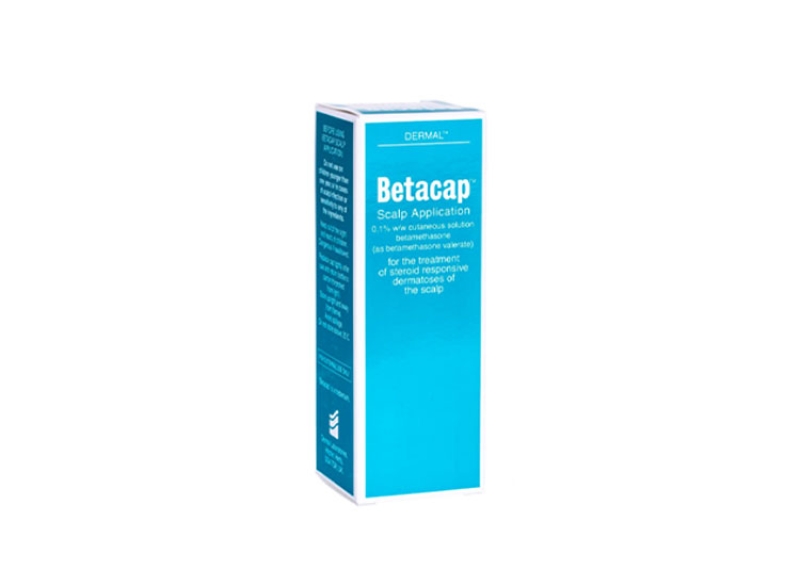Betamethasone Solution is a scalp application containing Betamethasone Valerate, a topical corticosteroid, as an active ingredient. It is used for the treatment of inflammatory scalp disorders seen in eczema and contact dermatitis.
Corticosteroids are used for reducing inflammation. Inflammation of the skin is due to the release by the immune system of various substances that cause the irritated area to become red, itchy, swollen, and painful like in the case of eczema or dermatitis. When Betamethasone is applied to the skin, it works inside the cells to inhibit the release of the substances that cause the inflammation. The medicine reduces swelling, itching, and redness of the skin.
Steroid scalp applications are useful to treat flare-ups short-term. Once the scalp improves, the steroid is usually stopped.
Betamethasone Solution must be applied thinly to the affected areas of the scalp once or twice daily. Use the solution less frequently the moment you notice improvements in your condition. If there is no improvement in the condition of your scalp after two to four weeks of treatment, you should consult our clinical team.
Follow the instructions below to ensure appropriate use of this medication:
- Betamethasone Solution should be applied sparingly to the irritated areas of the scalp, using the nozzle of the bottle.
- The solution may be rubbed to the scalp and then should be left to dry without washing it.
- If there is a need to wash your hair, wash it first and then let the scalp dry before you start applying the solution to the scalp.
- Take precaution to ensure that the scalp application will not run onto the face, particularly into the eyes.
- If an accidental application to the face occurs, wash it with cold water. Avoid applying the solution to the broken skin.
- Wash and dry your hands thoroughly after applying the solution to avoid the accidental transfer of the solution to other areas.
In the event you miss a dose, it is safe to apply the missed dose as soon as possible. However, if enough time has passed that you should be applying your next dose instead, simply skip the missed dose and resume your typical application schedule.
Always use this medication exactly as your clinician has told you. Check with our clinical team or your GP or pharmacist if you are not sure.
Medicines and their possible side effects can affect individual people in different ways. The following are some of the side effects that are known to be associated with this medicine. Just because a side effect is stated here, it does not mean that all people using this medicine will experience that or any side effect.
Side effects are more likely to happen if you use it on large skin areas or use it for long periods. Applying too much, or applying it to sensitive areas of the skin like the face, also increases the chances of side effects.
The most common side effect is a feeling of pain, itching, irritation, or burning in the affected area. These side effects do not last long. They disappear as the skin gets used to the medication.
For full information on side effects and correct use, see the patient information leaflet. If any side effects concern you, or you are experiencing any of the side effects mentioned in the patient information leaflet whilst taking this medication, please contact our clinical team or speak to your GP.
You should not use this scalp application if you have a skin infection on your scalp (this may appear as an open wound that may be sticky or have pus).
Stop using this medication and seek immediate medical attention if you experience any symptoms of high levels of corticosteroids in the bloodstream such as fatigue, irritability, increased thirst and urination, and muscle weakness.
In rare instances, using corticosteroid medications for a long time or over large areas of skin can make it more difficult for your body to respond to physical stress. It is important to tell your doctors that you are using this medication before undergoing a surgical treatment, or if you get a serious illness or injury.
Get emergency medical help if you have signs of an allergic reaction to this medication. These include:
- Hives
- Dizziness
- Fast or pounding heartbeats
- Wheezing
- Difficult breathing
- Swelling of your face, lips, tongue, or throat.
It is important that you let us know which prescription, over-the-counter medicines and recreational drugs you are currently taking. You must also tell us about any other medical conditions that you currently have (or had in the past). This will help us ensure the prescribed medication is safe and appropriate for you to take.
For full information on warnings, medication interactions and contraindications, refer to the Patient Information Leaflet. Please read all packaging and the Patient Information Leaflet before taking any new medicine and inform our clinical team or your GP of medicines you are taking or intend to take.







